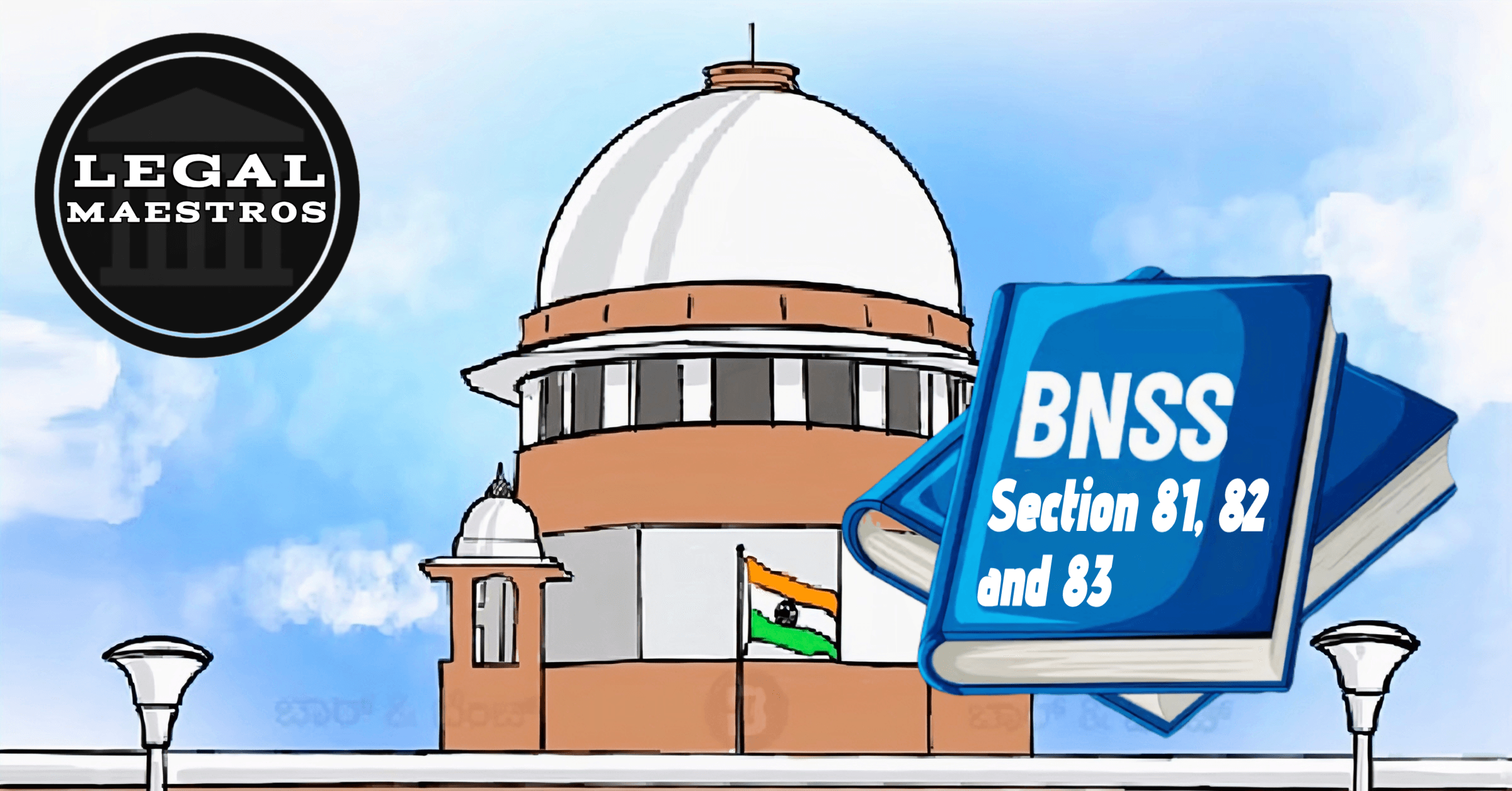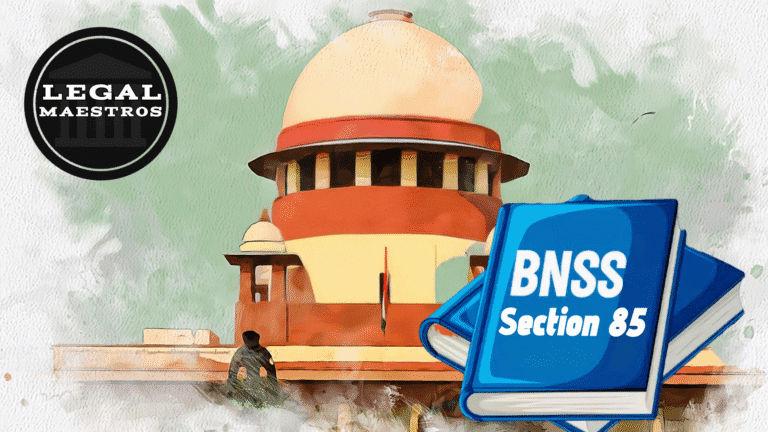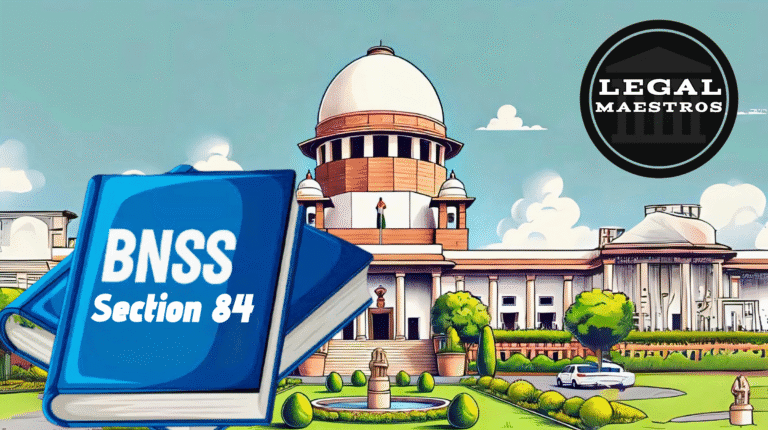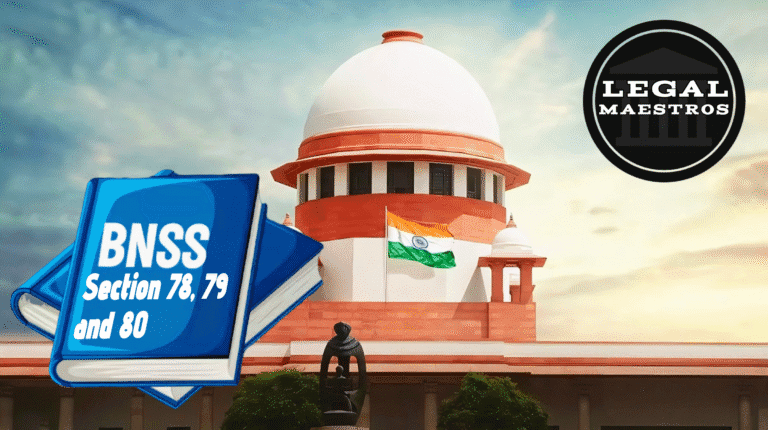
Section 81 – Execution of Warrant Outside Local Jurisdiction
When it is necessary to carry out the execution of a warrant outside of the jurisdiction of the court that issued it, Section 81 provides instructions on how the warrant should be carried out.
Warrant Endorsement is covered in the first subsection.
When a police officer receives a warrant that needs to be executed in a location that is outside the jurisdiction of the court that issued the warrant, he is required to approach either an Executive Magistrate or a senior police officer (at the very least the officer in charge of a police station) in the location where the warrant is to be executed. In order to obtain endorsement, the warrant needs to be presented to that authority.
In the event that a court in Delhi issues a warrant against a person who resides in Jaipur, the officer of the Delhi Police Department is required to travel to Jaipur in order to obtain the warrant approved by either a Jaipur Executive Magistrate or a Station House Officer.
For any queries or to publish an article or post or advertisement on our platform, do call at +91 6377460764 or email us at contact@legalmaestros.com.
The Function of Local Authorities, as Described in Section 2
Once the warrant is endorsed with the name of the Magistrate or senior police officer in the other jurisdiction, this endorsement becomes the legal authority for the police officer to carry out the execution of the warrant. It is also anticipated that the local police will assist in the execution of the warrant if it is required.
Continuing with the previous illustration, once the warrant issued by the Delhi court is approved by the Jaipur Magistrate, the Jaipur police may assist the Delhi officer in locating and detaining the individual who is being accused.
Urgent Execution without Endorsement is the subject of the third subsection.
This particular sub-section contains a provision that is unique. It is possible for the police officer to execute the warrant directly without first obtaining the endorsement, even if the officer is in a different jurisdiction. This is the case if the officer believes that going through the process of gaining endorsement will cause the arrest to be delayed, which could allow the individual to flee.
For any queries or to publish an article or post or advertisement on our platform, do call at +91 6377460764 or email us at contact@legalmaestros.com.
Consider the following scenario: a police officer in Delhi follows the suspect to a village in Rajasthan, where he is likely to flee. It is not necessary for him to wait for a Magistrate’s approval before he can instantly get the warrant executed.
Section 82 – Procedure on Arrest Outside the District
Section 82 addresses the circumstances that arise when an individual is taken into custody in a district that is not the same as the one in which the warrant was obtained.
First Subsection: Presentation in Front of the Authorities
If a person is arrested outside of the district where the warrant was issued, the individual who was detained is required to appear before an Executive Magistrate, District Superintendent of Police, or Commissioner of Police in the district where the arrest was made. With the exception of two circumstances, this must be carried out:
For any queries or to publish an article or post or advertisement on our platform, do call at +91 6377460764 or email us at contact@legalmaestros.com.
The site of the arrest is within thirty kilometers of the court that issued the warrant.
There is a stronger relationship between the Executive Magistrate, District Superintendent of Police, or Commissioner in the arresting district and the court that issues the warrant.
If, on the other hand, the police officer decides to maintain security in accordance with Section 73, then the individual in question is not required to appear before the local authority.
For any queries or to publish an article or post or advertisement on our platform, do call at +91 6377460764 or email us at contact@legalmaestros.com.
For example, a warrant is issued by a court in Agra, and the accused person is taken into custody in Mathura, which is only fifty kilometers distant. There is a possibility that the accused will be transported immediately to the Agra court if the Agra court is located closer to the local Mathura Executive Magistrate. If this is not the case, he ought to be hauled before the Magistrate of the area.
The Notification of Arrest, as mentioned in Section 2
In the event that an arrest is made outside of the district that issued the warrant, the officer who performed the arrest is required to immediately alert two parties:
The officer who is designated to make arrests in the corresponding district.
For any queries or to publish an article or post or advertisement on our platform, do call at +91 6377460764 or email us at contact@legalmaestros.com.
The officer of the law who is assigned to the district in which the individual who was arrested typically resides.
This guarantees that different districts are properly coordinated and that there is openness.
For example, if the accused is from Lucknow but was apprehended in Kanpur, the police in Kanpur are required to tell their district head as well as the police in Lucknow, which is the location where the offender typically dwells.
For any queries or to publish an article or post or advertisement on our platform, do call at +91 6377460764 or email us at contact@legalmaestros.com.
Section 83 – Action by Magistrate Before Whom Arrested Person is Brought
When the person who was arrested is brought before the Executive Magistrate, the District Superintendent of Police, or the Commissioner, this section specifies the processes that must be performed by each of these individuals.
Assurance and custody are covered in the first subsection.
First, the officer is required to confirm that the individual who has been arrested is, in fact, the same person who is identified in the warrant. The officer should make an order that the person be taken before the court that issued the warrant if they are satisfied with the situation.
Nevertheless, depending on whether the offense is bailable or non-bailable, there are certain exclusions and unique criteria that apply.
For any queries or to publish an article or post or advertisement on our platform, do call at +91 6377460764 or email us at contact@legalmaestros.com.
For Offenses That Are Bailable: If the offence is one that may be released on bail and the person who was arrested is prepared to give bail or security in accordance with the directions on the warrant (as stated in Section 73), then the officer is required to accept the bail or security and then deliver the bond to the court that issued the warrant.
In the case of non-bailable offenses, the person who has been arrested is typically not eligible for bail. However, in accordance with Section 80(2), the Chief Judicial Magistrate or the Sessions Judge of the district in which the arrest took place has the authority to release the individual on bail after conducting an examination of the appropriate documents and information.
For example, a person is taken into custody in Pune on the basis of a warrant that was issued by a court in Mumbai and was not eligible for bail. Despite the fact that the offense is not eligible for bail, the Pune Sessions Judge has the authority to issue bail if they have examined all of the paperwork and determined that it is appropriate.
For any queries or to publish an article or post or advertisement on our platform, do call at +91 6377460764 or email us at contact@legalmaestros.com.
Protection under Section 73, as outlined in Subsection (2)
It is made clear in this paragraph that the police continue to have the ability to accept security under Section 73, even in situations when the individual is brought before a Magistrate or another authority within the police force.






![Research Assistantship @ Sahibnoor Singh Sindhu, [Remote; Stipend of Rs. 7.5k; Dec 2025 & Jan 2026]: Apply by Nov 14, 2025!](https://legalmaestros.com/wp-content/uploads/2025/11/Gemini_Generated_Image_s0k4u6s0k4u6s0k4-768x707.png)
![Karanjawala & Co Hiring Freshers for Legal Counsel [Immediate Joining; Full Time Position in Delhi]: Apply Now!](https://legalmaestros.com/wp-content/uploads/2025/11/Gemini_Generated_Image_52f8mg52f8mg52f8-768x711.png)